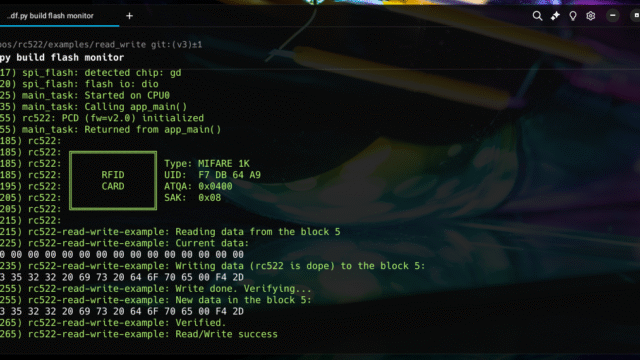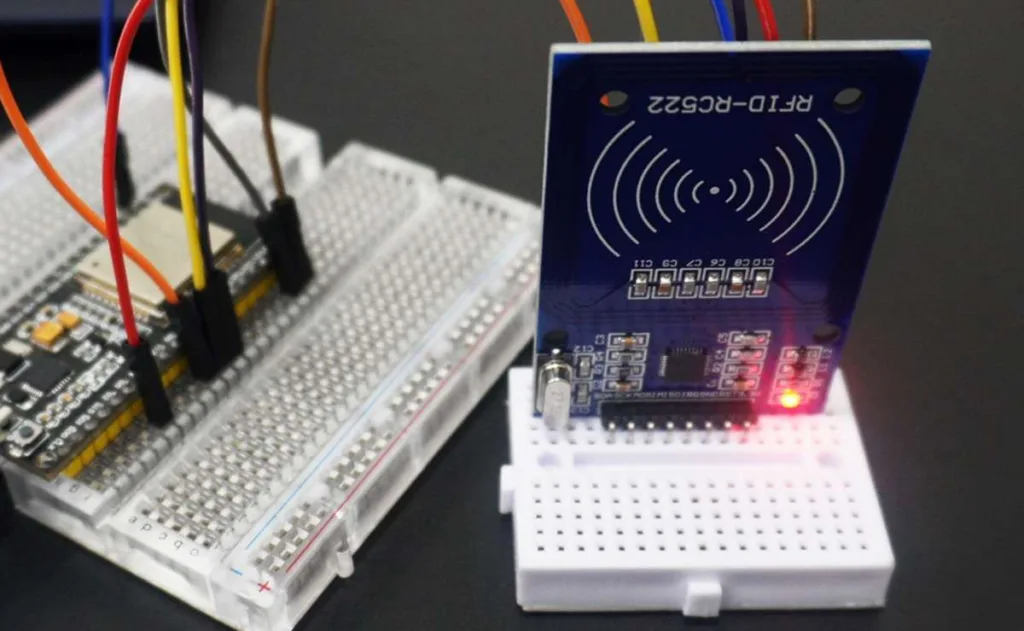
Introduction
RFID (Radio-Frequency Identification) is a widely used technology for contactless identification, access control, and short-range data transfer. The MFRC522 is a popular RFID reader/writer that supports ISO/IEC 14443 Type A cards such as MIFARE Classic and NTAG families.

The esp-idf-rc522 library is a lightweight and efficient ESP-IDF component, written in C, designed to simplify integration of MFRC522 modules with ESP32-based projects. It handles card polling, lifecycle events, and read/write operations, providing developers with a stable and extensible interface for RFID communication.
Features
- Card polling with lifecycle management
- Event callbacks for detection, removal, and status change
- Authentication support for MIFARE cards
- Read/write access to card memory blocks
- SPI and I2C communication support
- Unit testing framework for Linux
- Practical examples for real-world use cases
Installation
To add this component to your project, simply run:
idf.py add-dependency "abobija/rc522"This will fetch the latest compatible version using the ESP-IDF component manager.
Supported Cards
- MIFARE Classic 1K / 4K
- MIFARE Mini
- NTAG and Ultralight card families

The component supports a wide range of commands, making it suitable for reading, writing, and authenticating various card types used in everyday RFID applications.
Communication Interfaces
The MFRC522 module can be connected using:
- SPI (default)
- I²C
You can configure the GPIOs according to your needs. See the basic.c file in the example project for a working SPI setup.
Usage Examples
Run the Basic Example
To try the basic example:
idf.py create-project-from-example "abobija/rc522:basic"
cd basic
idf.py build flash monitorThis example shows how to:
- Initialize the RC522 module
- Detect cards and log UIDs
- Authenticate and read memory blocks
More examples, such as memory_dump, are available in the examples/ folder.
Security Notes
MIFARE Classic cards should not be used for security-sensitive applications.
- MIFARE Classic uses the Crypto-1 cipher, which is considered insecure.
- Some cards on the market allow changing the UID, which makes them unsuitable as unique identifiers.
- For secure authentication, consider using more modern card types like MIFARE DESFire or Plus (with AES encryption).
Terminology
| Term | Description |
|---|---|
| PCD | Proximity Coupling Device (e.g. RC522 reader) |
| PICC | Proximity Integrated Circuit Card (e.g. RFID tag or card) |
References
- MFRC522 Datasheet (NXP)
- ISO/IEC 14443 Overview
- MIFARE Classic 1K Datasheet
- Application Note AN10833 – Card Type Detection
- Application Note AN10834 – PICC Selection
Conclusion
The esp-idf-rc522 component is a robust and easy-to-use RFID library tailored for the ESP32 platform. With support for common card types, flexible communication options, and an event-driven design, it enables developers to build interactive and secure RFID-enabled applications with minimal effort.
Whether you’re building an access control system, an attendance tracker, or simply experimenting with contactless technology, this component provides a solid foundation for working with RFID cards on ESP32.
License
This project is licensed under the Apache 2.0 License.
See the LICENSE file for details.

Hello Developer,
I am a user from China. After using your driver in ESP-IDF, I encountered the following issue: When initializing a completely blank M1 card into the functional card I need, the driver fully supports this operation. However, when I try to convert an already initialized functional card into another functional card, a key verification error occurs. Nevertheless, I can confirm that the key I provided for verification is completely correct. (The so-called “functional card” is defined by us as a card with specific data written in Block 1 of Sector 0.)
My teacher told me that before verifying the key, it is necessary to re-execute the card detection, card selection, and anti-collision operations. However, I did not find any functions related to these operations in the driver you provided. Could you please help me solve this problem?